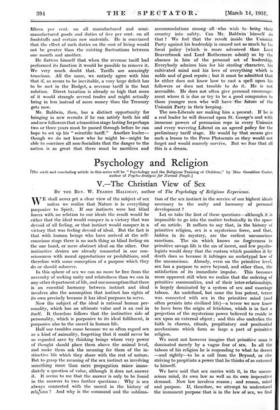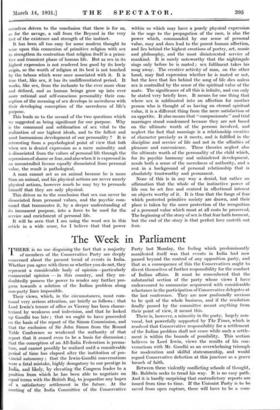Psychology and Religion
[The sixth and concluding article in this series will be " Psychology and the Religious Training of Children," by Miss Geraldine Coster, author of Psycho-Analysia for Normal People.]
V.—The Christian View of Sex
BY TILE REV. W. FEARON HALLIDAY, author of The Psychology of Religious Experience; WE shall never get a clear view of the subject of sex unless we realize that Nature is in everything purposive to Spirit. If our instincts were- but blind forces with no relation to our ideals the result would be either that the ideal would conquer in a victory that was devoid of all feeling, or that instinct would conquer in a victory that was feeling devoid of ideal. But the fact is that with human beings who have arrived at the self- conscious stage there is no such thing as blind feeling on the one hand, or mere abstract ideal on the other. Our instinctive desires are already connected in our con- sciousness with moral approbations or prohibitions, and therefore with some conception of a purpose which they do or should subserve.
In this sphere of sex we can no more be free from the necessity of seeking unity and relatedness than we can in any other department of life, and our assumption that there is an essential harmony between instinct and ideal involves also the assumption that instinct has rights of its own precisely because it has ideal purposes to serve.
Now the subject of the ideal is rational human per- sonality, which has an ultimate value and is an end in itself. It therefore follows that the instinctive side of personality, which is purposive to its ideal fulfilment, is purposive also to the sacred in human life.
Half our troubles come because we so often regard sex as a kind of animality, forgetting that it could never be so regarded save by thinking beings whose very power of thought should place them above the animal level, and make them ask the meaning for them of the in- stinctive life which they share with the rest of nature. But to grasp the meaning of the sex instinct as involving something more than mere propagation raises imme- diately a question of value, although it does not answer it. It seems to me that the answer is only to be found in the answers to two further questions : Why is sex always connected with the sacred in the history of relielons ? And why is the command and the sublimst- tion of the sex instinct in the service of our highest ideals necessary to the unity and harmony of personal development ?
Let us take the first of these questions—although it is impossible to go into the matter technically in the space of an article. It suffices to say that, in the history of primitive religion, sex is a mysterious force, and that, hidden in its mystery, are the earliest unconscious sanctions. The sin which knows no forgiveness in primitive savage life is the sin of incest, and few psycho- logists would deny that the custom which punishes it by death does so because it infringes an archetypal law of the unconscious. Already, even on the primitive level, sex has a purpose to serve beyond, and other than, the satisfaction of its immediate impulse. This becomes more apparent still when we realize that the ordering of primitive communities, and of their inter-relationships, is largely dominated by a system of sex and marriage taboos. An undefined, but none the less potent, terror was connected with sex in the primitive mind (and often persists into civilized life)—a terror we now know to have been the origin of fetichism, which is in fact a projection of the mysterious power believed to reside in sex upon an external object ; and this also underlies the faith in charms, rituals, propitiatory and penitential mechanisms which form so large a part of primitive religion.
We must not however imagine that primitive man is dominated merely by a vague fear of sex. In all the taboos of his religion he is responding to what he deems —and rightly—to be a call from the Beyond, or else striving to propitiate a power that he thinks of as external to himself.
We have said that sex carries with it, in the uncon- scious mind, its own law as well as its own imperative demand. Now law involves reason ; and reason, mind and purpose. If, therefore, we attempt to understand the immanent purpose that is in the law of sex, we find ourselves driven to the conclusion that there is for us, as for the savage, a call from the Beyond in the very fact of the existence and strength of the instinct.
It has been all too. easy for some modern thought to seize upon this connexion of primitive religion with sex to strengthen its contention that religion itself is a primi- tive and transient phase of human life. But as sex in its highest expression is not rendered less good by its lowly origin, so the worth of religion at its best is not touched by the taboos which were once associated with it. It is true that, like sex, it has its undifferentiated period. It works, like sex, from the inchoate to the ever_ more clear and defined, and as human beings grow up into ever more rational and self-conscious personality their con- ception of the meaning of sex develops in sacredness with their developing conception of the sacredness of life's purpose.
This leads us to the second of the two questions which we suggested as being significant for our purpose. Why is the command and sublimation of sex vital to the realization of our highest ideals, and to the fullest and most harmonious development of our personality ? It is interesting from a psychological point of view that both when sex is denied expression as a mere animality and is dissociated from the values of personal life through the repressions of shame or fear, and also when it is expressed in an uncontrolled license equally dissociated from personal value, the result is pathological.
A man cannot act as an animal because he is more than an animal, and his physical actions are never merely physical actions, however much he may try to persuade himself that they are only physical.
This drives us to the conclusion that sex can never be dissociated from personal values, and the psychic com- mand that transmutes it,' by a deeper understanding of its immanent purpose, into a force to be used for the service and enrichment of personal life.
It will be seen that I am using the word sex in this article in a wide sense, for I believe that that power within us which may have a purely physical expression in the urge to the propagation of the race, is also the power which, commanded by our sense of personal value, may and does lead to the purest human affection, and lies behind the highest creations of poetry, art, music and philosophy, and the most disinterested service of mankind. It is surely noteworthy that the nightingale sings only before he is mated ; sex fulfilment takes his song away. The creative activity of man, on the other hand, may find expression whether he is mated or not, but the love that lies behind the song of life dies unless sex is controlled by the sense of the spiritual value of the mate. The significance of all this is infinite, and can only be stated very briefly here. It means for one thing that where sex is sublimated into an affection for another person who is thought of as having an eternal spiritual value, it is a different thing from the mere satisfaction of an appetite. It also means that " companionate " and trial marriages stand condemned because they are not based on the ultimate worth of the persons involved, and neglect the fact that marriage is a relationship creative of character precisely as it meets, and is fulfilled in the discipline and service of life and not in the affinities of pleasure and convenience. These theories neglect also the ultimate worth of the personality of the child which, for its psychic harmony and unhindered development, needs both a sense of the sacredness of authority, and a rest in a background of personal relationship that is absolutely trustworthy and permanent.
None of this is in any way a denial, but rather an affirmation that the whole of the instinctive power of life can be set free and centred in affectional interest on objects worthy of it. It is thus that the fangs of fear which protected primitive society are drawn, and their place is taken by the surer protection of the recognition of a personal value which must at all costs be preserved, The beginning of the story of sex is that fear hath torment, but the end of the story is that perfect love casteth out fear.
























































 Previous page
Previous page